
Seioptera vibrans is a species of ulidiid or picture-winged fly in the genus Seioptera of the family Ulidiidae.

Psila fimetaria is a species of fly, a member of the family Psilidae.

Canace nascia is a European species of Canacidae.

Loxocera aristata is a species of fly and member of the family Psilidae.

Campiglossa loewiana is a species of fly in the family Tephritidae, the gall flies. The species is found in the Palearctic. The body is black brown; the upper part of pleuras and the midline of the scutellum dirty yellow. Femora 1 and III more or less browned.Oviscapte is a shiny black.Long. : 3-4 mm. The larvae feed in flower heads of Solidago virgaurea and Aster amellus.

Bradysia ocellaris is a species of fly in the family Sciaridae. It is found in the Palearctic. It has also been introduced to Australia. It feeds on fungi, and larvae can feed on cultivated plants in greenhouses.

Lonchaea chorea is a species of fly in the family Lonchaeidae. It is found in the Palearctic. The larva develops in cow dung.
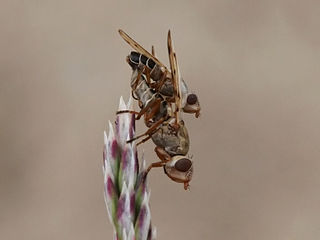
Tetanops myopina is a species of fly in the family Ulidiidae. It is found in the Palearctic. On the bulky wedge-shaped head the orbits have a large posterior macrochaete.The antennae are reddish. The body is transparent red covered in a dense grey white.The abdomen is gloss black, partially covered white in bands and a stripe, more so in the female. There are two pairs of prescutellar acrosticals and one pair of posterior dorsocentrals. The legs are entirely reddish. Long. : 5-7 mm.

Agromyza nigripes is a species of fly in the family Agromyzidae. It is found in the Palearctic. The body is black. The thorax and abdomen are shiny. There are 1 + 4 dorsocentral bristles and 7 rows of acrostical bristles. The wing veins are brown, yellow at the base. Long. : 2–3,5 mm. The larva makes serpentine mines in Medicago sativa leaves.
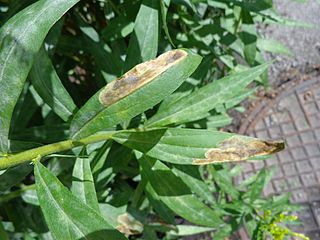
Nemorimyza posticata is a species of fly in the family Agromyzidae. It is found in the Palearctic.

Agromyza nana is a species of fly in the family Agromyzidae. It is found in the Palearctic. Description of imago-Interocular space red. Antennomeres 1 and II red. Peristoma and palps black. Dorsocentral bristles : 1 +3 subequal; acrostics in four rows. Legs black, knees red. Abdomen black with lighter pruinosity than the thorax. Long.:1,75-2,5 mm. The larva mines Trifolium pratense, Melilotus altissima, Medicago.

Phytomyza affinis is a species of fly in the family Agromyzidae. It is found in the Palearctic. Description of imago-Antennomere III brown black, 1-11 red. Mesonotum matt black lateral parts and notopleural depression yellow. Acrosticals in 2-4 rows. Coxae 1 yellow basally, II-III blackish. Femora yellow. Base of femora, tibiae and tarsi black. Abdomen brown black. Tergites with a yellow apical line dilated at the sides. Long. : 2,5–3 mm. The larva mines Cirsium arvense and also feeds on seeds of Euphrasia.
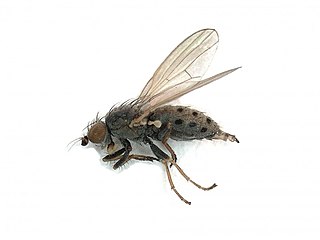
Chamaemyia flavipalpis is a species of fly in the family Chamaemyiidae. It is found in the Palearctic. and North Africa.
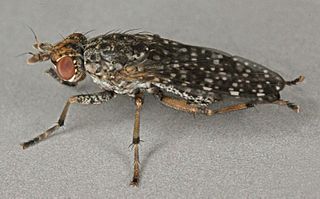
Dictya umbrarum is a species of fly in the family Sciomyzidae. It is found in the Palearctic and Nearctic. Long. : 4-5 mm. Intensely spotted wings.The interocular space with a black mark at the anterior orbital.The face is white with a black or brown central point. The antennae are reddish, the arista yellow at the base.The body is black covered in a grey yellow pruinosity with shifting (changeant) brown spots on the abdomen.The femora are grey with a brown apical band.The tibia are yellow with a brown apical ring (anneau). For terms see Morphology of Diptera. Dictya montana is a predator of aquatic pulmonate snails with no apparent parasitoid tendency.

Lauxania cylindricornis is a species of fly in the family Lauxaniidae. It is found in the Palearctic.Long 2-3.5mm. Small glossy black with yellowish wings black at the base. The porrect, cylindrical antennae are longer than the head. The habitat is lush vegetation in marshes. The larvae feed on micro-organisms within decaying plant tissues

Limnia unguicornis is a species of fly in the family Sciomyzidae. It is found in the Palearctic.
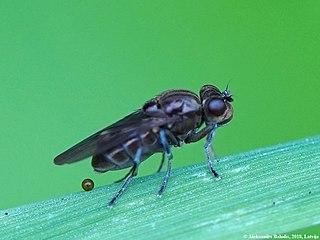
Parydra aquila is a species of fly in the family Ephydridae. It is found in the Palearctic. Jizz Face brilliant green-black. Tarsi red brown, never black. Long. : 3,5–5 mm. May to December. By ponds.

Minettia longipennis is a species of fly in the family Lauxaniidae. It is found in the Palearctic.
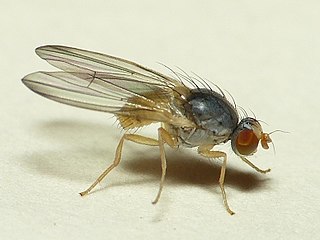
Palloptera ustulata is a species of fly in the family Pallopteridae. It is found in the Palearctic The wings are diffusely shaded brown with a darker tip. The back of the head is largely black.The face and antennae are yellow.The thorax is black with a fairly long whitish pilosity .The legs, tarsi and halteres are yellowish.Long. : 4 mm.The larvae develop under the bark of deciduous trees. It is part of a species complex and difficult to determine with certainty.

Ptychoptera albimana is a species of fly in the family Ptychopteridae. It can be found throughout the Palearctic but commonly found throughout Britain.




















